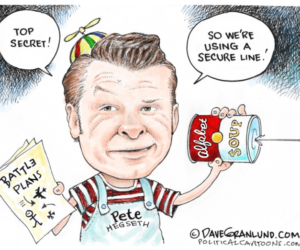
by Brian Cato
Our society is sick, and it goes far beyond Covid-19. The real illness is a series of interlocking culture failures we’ve neglected because, unlike our economic well-being, they can’t be pinned down by numbers and metrics.
Many would say the disease exists only at the top, with the man purportedly in charge of the CDC, the FDA, FEMA, and the NIH. The same man whose administration has frequently left the Covid response to the states and who said “I don’t take responsibility at all”. The man with enough clout at federal agencies like the CDC and the FDA that their decisions and recommendations have frequently been rescinded after outcries over their obvious political influence and questionable scientific basis.
But the epidemic of moral failures runs so much deeper. It extends to the multiple senators who were concerned enough about January briefings on Covid-19 to sell hundreds of thousands of dollars of stocks, but not concerned enough to alert the American people or take any congressional action. It extends to the heads of federal agencies like Dr. Francis Collins, Dr. Robert Redfield, Dr. Deborah Birx, and the much-admired Dr. Anthony Fauci, whose halfhearted actions have not been enough to stop 190,000 American deaths and counting from Covid-19.
Entrenched partisanship, putting party and political victories over country, has also infected our response to Covid. Many on the right have endeavored mightily to transform effective measures to contain the virus, from masks to stay-at-home orders, into culture war emblems. Whether out of some perverse attempt to reap partisan gain from the crisis or to keep the economy running so they looked better, their actions have predictably backfired, causing tens of thousands of deaths, and postponing our economic recovery. A sorely needed second major relief bill also appears to have been killed by uncompromising partisanship.
The pandemic has also cast in full light the pallor of our values. GDP is more important than human life. Corporate consolidation of hospitals, with its attendant seven-figure salaries for executives and personal protective equipment shortages for workers, is something newspapers crow about for a week and then forget. We treat the least among us by stuffing our elderly into underfunded facilities where they are neglected, isolated, and too often die. The importance we place on truth and reason and critical thinking is reflected in widespread conspiracy theories about inflated Covid-19 death totals, the sinister origins of the virus, the untrustworthiness of vaccines.
We value fealty and groupthink over originality and effectiveness in our politics. Otherwise, the CDC, which exists to protect Americans from health threats, would by now be overseeing an effective response including national testing, contact tracing, and supply manufacturing. A fresh, creative response would include a comprehensive economic solution to a crisis that has long been obvious will extend into early 2021.
Rather than a patchwork of poorly targeted assistance programs and a prayer, it would encompass a holistic plan to help the hardest hit businesses, like restaurants, retailers, gyms, and daycare centers, including a nationwide adjustment to their mortgages and rental agreements, perhaps administered by the Fed. It would replace part of the wages of those let go by these industries until they found new work, and help them develop new skills in the interim. While such massive undertakings would be manpower intensive, they would be amenable to the remote employment of so many who are suddenly deprived of their jobs.
But the societal illness Covid-19 has revealed requires a solution so much deeper than a response to the immediate crisis. There is no quick fix, no vaccine. America’s malaise will not be resolved by either the left’s Medicare for All and free college tuition, nor the right’s lower taxes and less regulation.
A real cure will require difficult, sustained, focused work. It will require regarding education not as a stepping stone to a job, but as a journey to becoming our best selves. It will require thinking of art not simply as entertainment, but as an opportunity to come to a deeper understanding of the world in all its complexity. It will require not worrying that our religious institutions are under siege in a culture war, but that they aren’t radiating enough love and enlightenment. And if religion’s power to motivate people continues fading, it will require us to reimagine meaning and purpose, to recognize a variant of the Golden Rule, that the only way our lives get better is if we unite to work together to make our world a better place to live.
It may seem strange, in the midst of a pandemic, to advocate for esoteric concerns like moral integrity, intellectual honesty, and broad-mindedness that will take decades to bear fruit. But effective policy, good governance, and visionary leadership don’t spring from wishes alone. If we haven’t yet suffered enough to recognize we need to do things differently, to begin treating the underlying causes of this deeper sickness, we’ll continue suffering larger and larger catastrophes until we do.
Writer and scientist Brian Cato is the author of the new book Candidate Spectrum. Brian is a chemist and computer scientist who pursued dual majors in philosophy and chemistry at Brown University, and now writes fiction in which he explores serious, complex, and timely political and societal issues with clarity and precision.
—
















